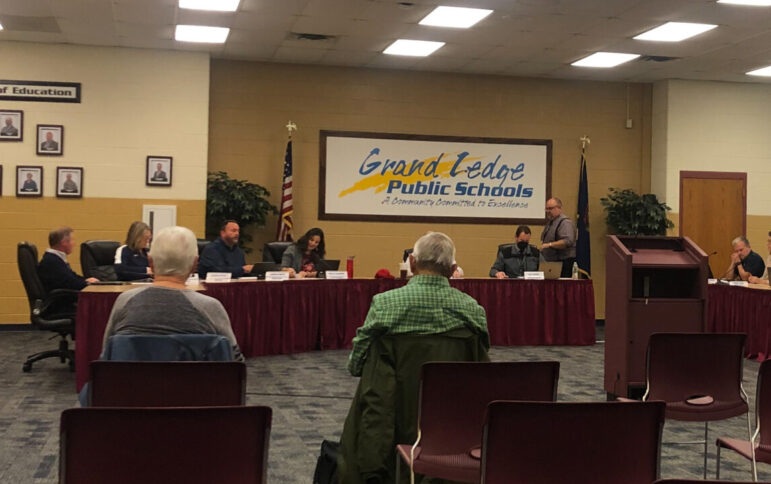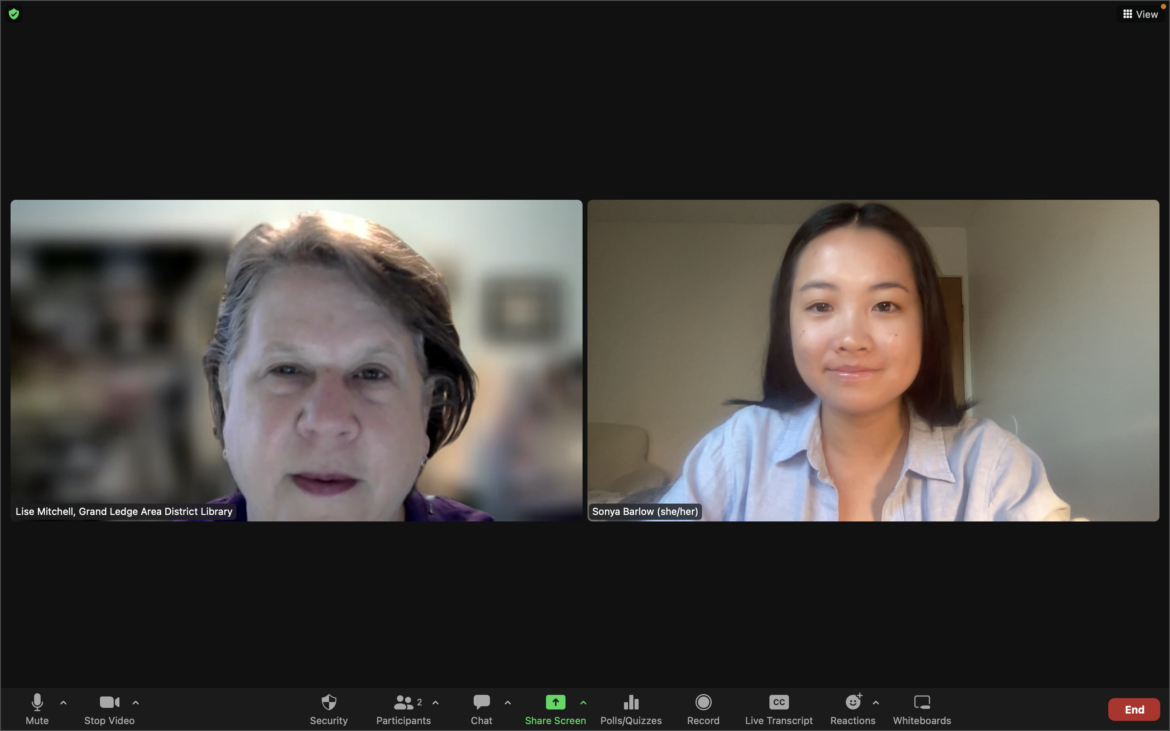Like many other public spaces across the country and the world, the Grand Ledge Area District Library (GLADL) was deeply affected by COVID-19, but director, Lise Mitchell, and the staff figured out ways to still stay connected and keep the community engaged.

Sonya Barlow
Grand Ledge Public Schools Board discusses the future of schools in the district on Oct. 10, 2022.The library’s main mission is to have a wide variety of informational, educational and recreational resources.
“We are always looking for ways to be relevant to the community,” Mitchell said.
She described having a wide range of online resources that patrons could use and which proved to be helpful during the pandemic. Some of the online resources include Consumer Reports, video databases, Overdrive, Hoopla, MelCat (Michigan eLibrary Catalog), etc.
Some of the library’s services were used more frequently due to the pandemic, such as the curbside pick up orders. Outdoor lockers were installed for those who wanted a contactless pick up.
In addition, their programs went virtual, which increased flexibility. Some of the virtual programs included, virtual story time and science experiments.
Spartan Newsroom Reporter Sonya Barlow spoke with the library director of the Grand Ledge Area District Library, Lise Mitchell, about how she became a library director and how COVID-19 affected the Grand Ledge Area District Library.
Barlow:
What do you do as a library director?
Mitchell:
Well, I manage the day to day operations of the library. I’m responsible for hiring the staff, sort of running the library, the community outreach, organizing, implementing the strategic plan, overseeing the budget, doing all of the long term planning for the library.
Barlow:
How did you get into being a library director?
Mitchell:
Well, originally when I went to library school, I was actually going to be in archives and there weren’t as many jobs in archives and I got interested in cataloging and worked at the library of Michigan with the newspaper project for Michigan. A job opened up at the Veterans Memorial Library in Mount Pleasant and I ended up there as a technology coordinator. I really enjoyed working in a public library. I liked the variety of the work, sort of the spontaneity of working on different projects all the time. I ended up becoming the director of Veterans that covered pretty much all of Isabella County. My husband was working in Lansing, and I was driving north and so now we’re very happy to go to Grand Ledge.
Barlow:
What is the newspaper project?
Mitchell
It was part of the United States newspaper projects…finding all the newspapers across the United States, collecting them and digitizing them. The first step was cataloging them. So I would find all the different newspapers and sort of create family trees. Then they were also trying to find where the papers were stored.
Then the next step was getting them digitized because a lot of these papers are really fragile. The project was intended to digitize them, so that you could then easily search.
We have the Grand Lodge Independent digitized going back to 1875 at my library. We’ll have people come in and it’s all online, but the idea is that you can search it easily and find the kind of information going forward.
Barlow:
That’s really cool that you were able to digitize them.
Mitchell:
Yes, they’re still digitizing them because it’s not the most…well, they’re getting better about the costs, but it’s still not the cheapest process because of these large format scanners.
Barlow:
What did you use to preserve them?
Mitchell:
Well, unfortunately once they get digitized, we’re not as worried about preserving the papers. So, sometimes they do try to keep the newspapers, but once it’s digitized, we are more interested in keeping the information rather than the original paper.
Barlow
How does this library help out the Grand Lodge community in general?
Mitchell:
Well, one of our biggest missions is that we provide, you know, it’s an information resource. There are a lot of electronic resources, but we also have a print collection, and we also have access to MeLCat which has 50 million items across 400 libraries. So it really helps Grand Ledge feel connected to a much larger community. We have a crafting program that a lady leads to make craft items for a local food pantry. We have a Minecrafting program where the kids come in, and they’re playing Minecraft. Just before COVID hit, we had a grant for a coding club, and the kids were learning coding and helping each other learn.
Barlow:
How has COVID impacted your job and the library?
Mitchell:
Well, we were shut down for the three months. And so we really worked with a lot of people, getting them more used to online resources, and talking to a lot of people on how to use our online materials. I think our biggest changes we’ve seen is that people’s visits to the library are more frequent, but they’re shorter in duration. We added outdoor lockers so that for people that wanted that contactless pickup. We also do curbside where they can pull up and we’ll pop something into their trunk.
Barlow:
Did you do any programs like online programs through Zoom?
Mitchell:
Yes, we did virtual storytime. And then we did a thing called “Curious Claddle.” So we did science experiments…a volcano…rocket…airplanes. They were ones that we put together ourselves where we showed what you could do with simple things that you might have at home. And so we had those available and we still have the videos up on our website of exploding rockets and airplanes.
Barlow:
Do you have programs in person?
Mitchell:
Yeah, pretty much we’ve gone all in person. Now and then we do have a presenter that wants to be virtual and so we will do that. We had a lot of our summer reading stuff outside…we do an in-person crafting night. So it’s a number of different things that we do. And sometimes we have a pass up program… like little games that you can play on our sidewalk.
Barlow:
What kind of games are there?
Mitchell:
It’s like hopscotch and you pretend to be different animals. And then we’ve also been doing story walks. We have one downtown where you can read a story as you go through stores. And then we have one in Lincolnberg Park where you walk through the park and you read a story and then you have some actions to do as you’re reading the story. And so it sort of combines the early literacy and physical activity as you’re out enjoying a stroll.
Barlow:
So, what are the most important decisions you’ve made as a leader in the community?
Mitchell:
We’ve always been trying to partner with the schools. We were able to get every single student an e-card, and make that a priority…when the schools want us to come through, we make sure we clear our schedules and make it a priority to get out to the schools. We visit Adventure Club four times a month…the after school daycare, because we want to make sure that reading is a component for the schools.
Barlow: What’s important about being a library director?
Mitchell:
Well, I think it is working with the connections with the community. I’m very fortunate. I have a great staff. I have a really supportive board. And the community has been really welcoming. I came here about 10 years ago and it’s been really nice. I still get to do a little bit of collection of elements, which is traditionally the librarian work, but most of my life is meetings and reports and budgets, which isn’t very librarian-ish. When the kids come in, and they’re happy to be in the library, and I see the adults coming in and they find the book that they’re looking for…that’s what makes me feel like I’m doing good work.
Barlow:
What things do you hope to improve for the future?
Well, we’re looking to do some changes at our children’s area to add more collection space. We want to do some changes with our shelving to add more collections…out in Wacousta we’re hoping to do a partnership with the township with the old elementary school. So that would be very exciting to have the new branch library.
Barlow:
Another branch would be great, right…expanding it?
Mitchell:
Yes. We’ve always wanted an outreach bookmobile so that we could go into any neighborhood and be able to visit.
Barlow:
Thank you for taking the time out of your day to meet with me. I really appreciate it.
